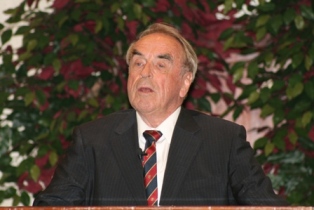The following is an interview of
Jurgen Moltmann
by Journalist Florian Berndt

|
Jürgen Moltmann, professor emeritus of Tübingen University in Germany, was the keynote speaker at a recent conference in the US, at the Duke Divinity School, which sought to inspire dialogue for theological reflection on creation and the world of sciences. A growing number of people consider Moltmann to be the greatest theologian alive this century, and his ‘Theology Of Hope’- published in English in 1967- counts as his most influential work. In it he proposes that Christian hope should be the central motivating factor in the life and thought of the church and of each Christian. For Moltmann, the whole creation longs for the renewal by the "God of Hope." Empowered by hope, the Christian's response should therefore involve: mission of the church to all nations, the hunger for righteousness in the world, and love for the true life of the imperiled and impaired creation. This underlying theme of Moltmann’s theology stands out in all of his books, and he was more than ready to explore it’s implications in a recent interview with Tentmaker.
Professor Moltmann, as a modern-day theologian, what would you say about your personal relationship with the Person of Jesus Christ?
Jesus found me when I was 18 years old, during the Second World War, while a prisoner of war in an English prison camp. The testimony of other believers and reading of the scriptures- especially the Psalms and Mark’s Gospel- made a lasting impact on me and forever changed my life. Since then I live in His ever-present presence and in expectation of His future.
What would be the most central message of your theology?
Surrendering to Christ’s work on the cross and the power of His resurrection.
How did you find your ‘theology of hope’?
It was a process that developed during my five years of ministry as a pastor, and later as a lecturer on the expectation of the Kingdom of God. at the University in Wuppertal, Germany. The final idea to put my thoughts into print came about through conversations with the Jewish philosopher Ernst Bloch. At this time there were a lot of books on faith and love, but virtually none about hope. Bloch motivated me to do something about it.
Do you think your thoughts are better received in the US, having recently been there on a teaching visit, or in your own home-country in Germany?
Well, America always seemed to me to be the land of hope. Also of apocalyptic fears, that’s for sure, but I think people in America are much more open to the idea of hope than in Germany. The success of Barak Obama’s book ‘The Audacity Of Hope’ would be a good example for this. In Germany everything is much more traditional and institutionalized. I like the USA. If I would be 30 years younger I would have stayed there.
How is hell considered, if at all, in your theology of hope?
I believe in Christ's Descent to hell. He came back and declared: “I have the keys to death and hell!” What does He do with these keys? He opens them up of course! When you think of hell, you should never think about it in the context of the question whether you yourself or someone else is going there, but always look to Christ. In His wounds, death and hell have been overcome. Which is, by the way, also the counsel Johann of Staupitz gave to his pupil Martin Luther.
What would happen if the church at large would follow this counsel and proclaim such a victorious Christ?
We would experience the power and life of the Holy Spirit. Especially the true power of forgiveness. If you think about it, wanting to send someone to hell has to do with the desire of revenge. Only if one looks to Christ can such a evil desire be overcome. And I am talking from experience here.
What would be your personal message to this generation?
Believe in the resurrection of the crucified Christ and live in the Light of His reality and future.
Back to Tracing Universalist Thought Index